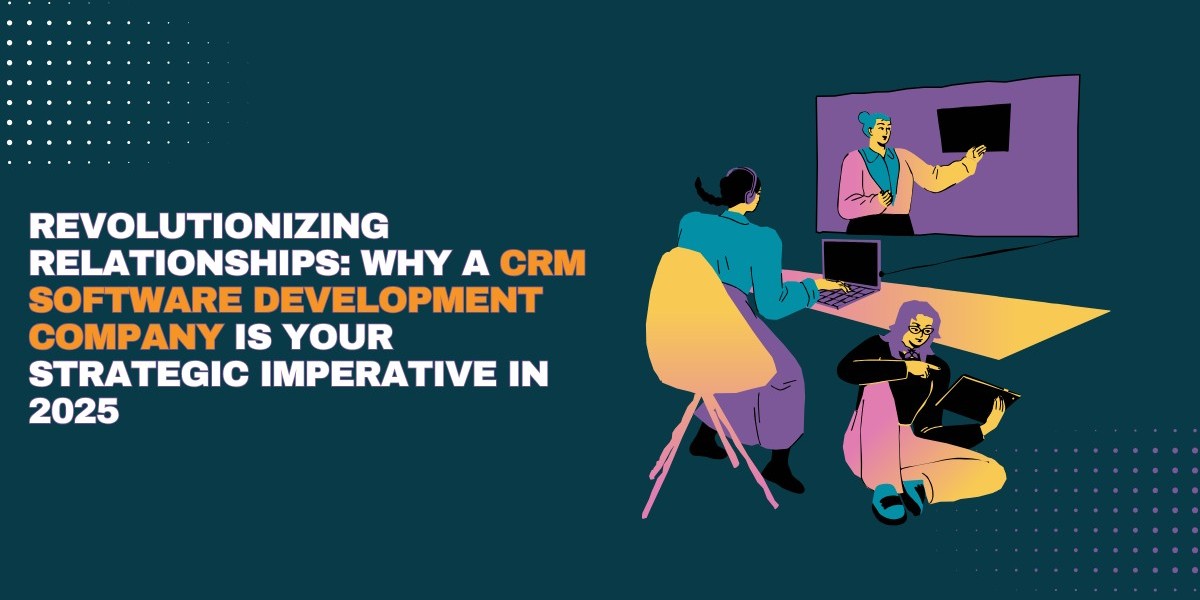In the dynamic business landscape of 2025, customer relationships are no longer just about transactions; they are the bedrock of sustainable growth, loyalty, and competitive advantage. In an era of hyper-personalization, instant gratification, and omnichannel interactions, a generic, off-the-shelf Customer Relationship Management (CRM) solution often falls short. This is why more and more forward-thinking businesses are turning to a specialized CRM Software Development Company to build bespoke systems that perfectly align with their unique workflows and future aspirations.
This comprehensive guest post will illuminate the critical role of custom CRM in 2025, dissect the compelling benefits of partnering with expert developers, outline the modern development process, showcase the transformative trends shaping CRM, and provide invaluable guidance on selecting the right company to craft your ultimate relationship-building tool.
The Evolution of CRM: Beyond Basic Contact Management
Forget the old notion of CRM as merely a glorified digital Rolodex. In 2025, CRM systems are the central nervous system of any customer-centric organization. They are sophisticated platforms that integrate sales, marketing, and customer service functions, providing a holistic, 360-degree view of every customer interaction.
Here's why a robust, often custom-built, CRM is indispensable:
Hyper-Personalization at Scale: Customers today expect experiences tailored specifically to their needs and preferences. Modern CRMs, especially those infused with AI, allow businesses to collect, analyze, and leverage vast amounts of customer data to deliver hyper-personalized communications, product recommendations, and service interactions. This builds deeper trust and loyalty.
Omnichannel Consistency: Whether a customer interacts via email, phone, social media, live chat, or an in-person meeting, they expect a seamless and consistent experience. An advanced CRM unifies these touchpoints, ensuring that every team member has the complete context of a customer's journey, leading to smoother handoffs and improved satisfaction.
Data-Driven Decision Making: In a world awash with data, the challenge isn't collection, but deriving actionable insights. Modern CRMs, particularly those with strong analytical capabilities, transform raw data into intelligent forecasts, identify churn risks, highlight conversion opportunities, and reveal bottlenecks in sales and marketing pipelines.
Automated Efficiency: Repetitive administrative tasks consume valuable time that could be spent on high-value interactions. CRMs in 2025 heavily leverage AI and automation to streamline lead scoring, email follow-ups, appointment scheduling, data entry, and even initial customer service queries, freeing up human talent for more strategic work.
Enhanced Team Collaboration: With remote and hybrid work models becoming the norm, a centralized CRM ensures that sales, marketing, and customer service teams are always on the same page. Shared customer profiles, communication histories, and real-time updates foster seamless collaboration, breaking down departmental silos.
Why Custom CRM is Your Competitive Edge in 2025
While off-the-shelf CRM solutions like Salesforce, HubSpot, or Zoho CRM offer a wide array of features, they are designed for a broad audience. Your business, however, has unique processes, specific industry regulations, and distinct customer journeys. This is where a custom CRM software development company truly shines.
The benefits of a tailor-made CRM are profound:
Perfect Fit for Unique Workflows: Unlike generic systems that force you to adapt your processes to the software, a custom CRM is built around your specific operational workflows. This eliminates inefficiencies, reduces training time, and ensures maximum adoption by your team.
Optimized User Experience (UX): A custom CRM can be designed with an intuitive interface and navigation specifically for your users. This translates to higher productivity, fewer errors, and a more enjoyable experience for your sales, marketing, and support teams.
Scalability Tailored to Your Growth: Off-the-shelf solutions can become rigid as your business grows or pivots. A custom CRM is architected for scalability, allowing you to seamlessly add new features, integrate with emerging technologies, and handle increasing data volumes without disruption.
Seamless Integration with Existing Systems: Businesses rarely operate in a vacuum. A custom CRM can be designed to integrate perfectly with your existing ERP, accounting software, marketing automation platforms, e-commerce stores, and other crucial tools, creating a unified data ecosystem.
Enhanced Security and Compliance: Your customer data is invaluable. A custom CRM allows you to implement industry-specific security protocols and compliance measures (like GDPR, HIPAA, etc.) directly into the system's core, offering a level of data protection that generic solutions may not provide.
Cost Efficiency in the Long Run: While the initial investment might be higher, a custom CRM eliminates recurring subscription fees for unused features, reduces the need for costly workarounds, and ensures you're only paying for functionalities that directly benefit your business. It also provides a stronger ROI over time due to increased efficiency and better customer outcomes.
Unleashing Unique Competitive Advantage: By having a CRM that precisely reflects and optimizes your unique selling propositions and customer engagement strategies, you gain a significant edge over competitors relying on off-the-shelf solutions.
The Journey of Innovation: How a CRM Software Development Company Operates
The process of building a custom CRM is a collaborative journey that typically involves several key stages:
Discovery and Requirements Gathering: This foundational phase involves deep dives into your business. The development team works closely with your stakeholders across sales, marketing, and customer service to understand your current pain points, future goals, desired functionalities, and specific industry nuances. This culminates in a detailed Business Requirements Document (BRD).
Strategic Planning and Technology Stack Selection: Based on the requirements, the company defines the project scope, outlines an MVP (Minimum Viable Product) if applicable, and selects the most appropriate technology stack (e.g., programming languages like Python, Java, JavaScript frameworks like React/Angular/Vue, database technologies, and cloud platforms). A detailed project roadmap with timelines and milestones is established.
UI/UX Design and Prototyping: A critical phase focused on creating an intuitive and efficient user experience. This involves:
Wireframing: Creating skeletal outlines of the app's layout and user flow.
Mockups: Developing static visual representations of the interface.
Prototyping: Building interactive, clickable versions of the app to simulate user experience and gather early feedback before extensive coding.
Development and Coding: This is where the actual building happens. Experienced developers translate the designs and requirements into a functional system. This includes:
Front-end Development: Building the user-facing interface.
Back-end Development: Creating the server-side logic, databases, and APIs that power the system.
Integration: Connecting the CRM with other essential business tools and third-party services.
Quality Assurance (QA) and Testing: Rigorous testing is performed at every stage to identify and fix bugs, ensure functionality, check performance, and verify security. This includes unit testing, integration testing, system testing, user acceptance testing (UAT), and security audits.
Deployment and Implementation: Once thoroughly tested, the CRM is deployed to your chosen environment (cloud, on-premise). This often involves data migration from existing systems and comprehensive training for your team to ensure smooth adoption.
Post-Launch Support, Maintenance, and Iteration: A reputable CRM development company provides ongoing support, bug fixes, performance monitoring, security updates, and feature enhancements. This continuous iteration ensures your CRM evolves with your business and stays ahead of market changes.
CRM Trends Shaping 2025: What to Expect from Your Partner
The CRM landscape is in constant flux, driven by technological advancements and shifting customer expectations. A leading CRM software development company will be experts in these key trends for 2025:
Deep AI and Predictive Analytics Integration: AI is moving beyond simple automation. Expect CRMs to offer advanced lead scoring, predictive deal outcomes, proactive churn prediction, and AI-driven recommendations for "next best actions" for sales and service agents.
Customer Data Platforms (CDPs) as the Core: The need for a unified, 360-degree view of the customer will drive tighter integration with CDPs, which aggregate data from all touchpoints (web, mobile, social, IoT) into a single, comprehensive customer profile.
Omnichannel Convergence & Conversational AI: CRMs will seamlessly manage conversations across all channels (email, chat, social, voice) while leveraging conversational AI and voice recognition to automate routine inquiries, document interactions, and provide real-time support.
Low-Code/No-Code Customization: While custom development provides ultimate flexibility, the rise of low-code/no-code tools within custom CRMs will empower business users (citizen developers) to make minor adjustments, create workflows, and build reports without deep technical expertise, fostering agility.
Immersive Customer Experiences (CX): Expect CRMs to integrate with emerging technologies like Augmented Reality (AR) and Virtual Reality (VR) for enhanced sales demos, virtual product try-ons, and more immersive customer support experiences.
Enhanced Cybersecurity and Ethical AI: With increasing data volumes, robust security protocols, data residency controls, and ethical AI frameworks will be paramount to build and maintain customer trust.
IoT-Driven Insights: Integration with IoT devices will provide real-time data on product usage and customer behavior, enabling proactive service, predictive maintenance, and highly personalized engagement based on actual product interaction.
Focus on Full-Lifecycle Customer Experience Management (CXM): CRMs will increasingly support the entire customer journey, from initial lead generation and sales to onboarding, ongoing service, retention, and even advocacy, turning transactions into lasting relationships.
Choosing Your CRM Software Development Company: A Partnership for Success
Selecting the right CRM development partner is perhaps the most critical decision in this journey. Consider these factors:
Expertise and Portfolio: Look for a company with a proven track record in CRM development. Review their case studies, client testimonials, and technical capabilities, especially in modern CRM technologies and trends.
Industry Experience: Does the company have experience building CRMs for businesses in your specific industry? Industry-specific knowledge can be invaluable in understanding unique challenges and compliance requirements.
Communication and Transparency: Opt for a partner with excellent communication skills, transparent project management methodologies (e.g., Agile Scrum), and a collaborative approach. Regular updates, clear reporting, and open feedback loops are essential.
UI/UX Design Philosophy: A powerful CRM is only effective if it's user-friendly. Assess their UI/UX design process and portfolio to ensure they prioritize intuitive and efficient user experiences.
Technical Stack Alignment: Discuss their recommended technology stack and ensure it aligns with your long-term scalability and integration needs.
Quality Assurance Processes: Inquire about their rigorous testing methodologies, security audits, and commitment to delivering a bug-free, robust solution.
Post-Launch Support & Maintenance: A truly valuable partner offers comprehensive post-launch support, maintenance, and strategic guidance for future enhancements and scalability.
Cost and Pricing Model: Get a detailed breakdown of costs, understand their pricing model (fixed-price, time & material, dedicated team), and ensure it aligns with your budget. Remember, the cheapest option upfront may not be the most cost-effective in the long run.
References and Reviews: Beyond their website, check independent review platforms (like Clutch, GoodFirms) and ask for direct client references to validate their reputation and reliability.
Conclusion
In 2025, your Customer Relationship Management system is more than just software; it's a strategic asset that fuels growth, fosters loyalty, and defines your competitive posture. While off-the-shelf solutions offer a starting point, a custom CRM, developed by an expert CRM Software Development Company, provides the precision, flexibility, and scalability needed to truly optimize every customer interaction.
By investing in a tailor-made solution, you're not just buying software; you're investing in a future where every customer feels understood, every interaction is impactful, and your business operates with unparalleled efficiency and insight. Choose your partner wisely, and together, unlock the full potential of your customer relationships.







